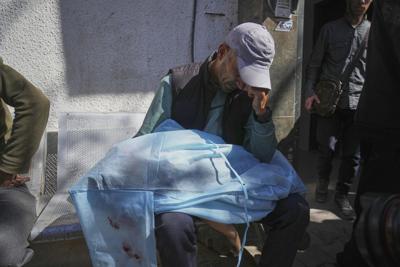Imagine living in a world of smashed concrete, twisted metal. Flowers can’t grow, roads too demolished to drive, no running water. Lost family, displaced friends. Schools, gone. Sounds like a dystopia. Except it’s real. (We caused it.)
Israel has a blank check to bomb Gaza with zero guardrails. This is unacceptable.
I lived in Nablus, in the occupied Palestinian territories of Israel from 2012 through 2013. The West Bank is frequently visited by religious groups to see Bethlehem and Jericho. But Nablus, a Muslim city, is less frequented by tourists, if at all.
I taught in the literature department at An-Najah National University. At 22,000 students, it is the largest university in Gaza. It started as an elementary school in 1918 and became a college in 1941.
Graduation was beautiful to witness.
For graduation in spring 2013, we squinted under sunglasses. The sky was azure blue. White chairs were set up in the outdoor stone amphitheater. Thousands of family members surrounded the graduates.
Students stood on chairs, waving brightly colored bouquets. On one side sat female students, the other, men. Both graduated in about equal number. As a foreign professor, I seamlessly moved between the two groups, gender norms fairly bendable for me.
At one point, a particularly funny grandmother pulled her granddaughter onto the stage. A sea of cousins jumped in, dancing, twirling. Then, others joined in an exuberant display. Later, there would be feasting. Food is humanity’s universal love language. And Gaza has dazzling flavors.
What was clear to me throughout my professor experience was how much Palestinians value education.
Families save assiduously for college. I watched a shepherdess in the town of Yanoun selling salty sheep’s cheese. She saved and saved for her daughter’s textbooks.
However, unlike my students, there will be no graduations in Gaza this spring. No diplomas. No finished Ph.D. programs. No formal schooling.
Airstrikes decimated 95% of Gaza’s schools, according to the U.N. All 14 universities have been damaged or destroyed by the Israel Defense Forces. In a nation where nearly half the population is under 18, the effects on education are devastating. There are 625,000 students.
The U.N. calls what is happening ‚Äúscholasticide.‚ÄĚ This is where educational infrastructures are intentionally destroyed. Teachers and students are systematically targeted. It is a strategy for prolonged disadvantage.
For an entire generation, Gazans will be academically stunted. They will produce no painters, musicians, chemists, engineers, doctors, lawyers or teachers. Academics halted mid-Google-search, mid-whiteboard mark, mid-poem.
Without education, Gazans will be unable to compete in life.
Evidence of this horror is available 24/7 at our electronic fingertips, yet the silence is deafening. It is not possible for people to leave the Gaza Strip legally.
Between October 2023 and January 2025, the medical journal, The Lancet, reports, life expectancy was nearly halved in Gaza, dropping from 75.5 years to 40.5 years.
A jarring and powerful CNN video-journalism expose, ‚ÄúGazan Education in Ruins,‚ÄĚ shows children learning in tents with plastic tarp floors, no chairs and overturned cardboard boxes for desks.
Another scene from the multimedia article shows students around a board in an exploded, windowless building, like a jagged cave. Their ‚Äúschool,‚ÄĚ perched on a mound of rubble. If you fell, there would be no soft landing; you‚Äôd be shredded by metal and glass. Shoes are a necessity in such a hellscape.
It will take generations to rebuild all the schools. Millions of books and numerous libraries were destroyed.
Which is more terrifying, to try to sleep at night, with gnawing hunger, bombs blasting and unable to see strangers surrounding you, surely a major risk for women and girls? Or daylight, where you can see bloodied bodies and your precious home reduced to rubble?
At least in daylight, a child can see a book. And children are holding them, even in this time and place. For a moment before an explosion, a child can imagine another world, a child is free.
Just as it took generations for my people to begin healing from the Holocaust, it will take generations for Palestinians to heal from the pain transferred onto them. All children are deserving of life, safety and learning.
Israel‚Äôs complete food blockade is creating a genocide of starvation. There is almost no food left in Gaza. It is an unlivable situation. Israel created the blockade on March 2, then, according to National Public Radio, ‚Äúshattered a two-month ceasefire.‚ÄĚ
I call upon all of us to speak out against this barbarism. The siege on Gaza must end. Killing Gazan education is our moral failing.










